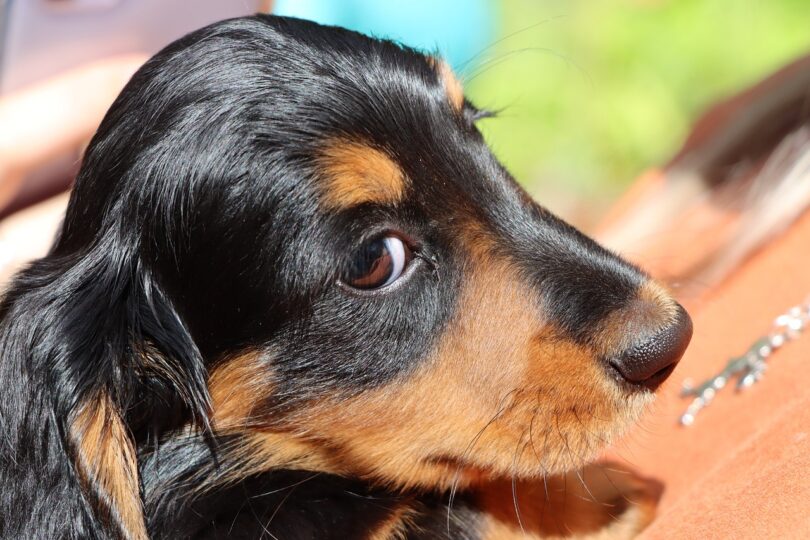One question perplexing many Dachshund owners is why their pet seems jealous of other dogs. This is why I created this post to help you. You will learn the different signs of jealousy and 5 different ways to prevent this from happening.
Jealousy is a complex emotion requiring advanced cognitive abilities. Observational studies suggest that dogs display behaviors indicative of jealousy.
Dachshunds are particularly notorious for displaying such traits, especially when they feel that their bond with their human is threatened.
This behavior is mostly observed when you adopt another dog or a canine passing by during a walk. This is because Dachshunds are naturally protective of their territory and loved ones.
Before you look at the prevention measures, let us learn more about the signs of jealousy.
Signs And Triggers of Jealousy
Dachshunds will often display specific behaviors when they feel jealous, including:
Growling or Snarling – A low growl or snarl directed at the other dog is a sign of jealousy.
Pushing In – Your Dachshund will try to physically place themselves between you and the other dog.
Attention Seeking Behavior – This ranges from pawing at you to barking to get your attention.
Stress Signals – Lip licking, yawning, and pacing are good stress indicators, which could be rooted in jealousy.
Here are the common triggers:
New Pets – Introducing a new pet into the household will make your Dachshund feel uneasy and insecure.
Affection – If you are petting another dog, your Dachshund may become envious of your attention to someone else.
Limited Resources – Dachshunds get jealous when another dog takes their toys, treats, or space.
How to Address Jealous Behavior (5 Ways To Help)
Here are five comprehensive ways to help manage and mitigate jealous behavior in your Dachshund:
1) Positive Reinforcement Training
Positive reinforcement involves rewarding your dog for desired behaviors. This helps them associate good conduct with treats, praise, or playtime.
Whenever your Dachshund behaves well around other dogs—be it sitting calmly, not growling, or not showing any signs of jealousy—immediately reward them. This can be with a small treat, verbal praise, or a quick game with their favorite toy. The idea is to create a positive correlation between behaving well around other dogs and receiving rewards.
I recommend using a clicker for better timing and to signal the exact moment the desired behavior occurred. This technique is proven to be highly effective in shaping dog behavior.
2) Obedience Training and Basic Commands
Ii is always a great idea teaching your Dachshund basic commands like “sit,” “stay,” “come,” and “leave it.” This will help mitigate and manage jealous behavior.
Training should begin in a controlled environment to avoid any distractions. Once the basic commands are mastered, start practicing them in situations where jealousy is triggered. This mostly works when your Dachshund is interacting with another dog.
Keep training sessions short but frequent to maintain your Dachshund’s attention. In addition, you should take this opportunity to teach your dog new tricks.
3) Redirect Attention
Redirect attention is another good way to mitigate jealousy. Steering your dog’s focus away will make them distracted.
If you notice your Dachshund displaying jealous behavior, try to redirect their attention. This could be as simple as throwing a ball or engaging them in a quick game of tug-of-war.
Redirection works best when combined with positive reinforcement. After successfully diverting their attention, offer a reward to reinforce the positive behavior.
4) Early and Consistent Socialization
Expose your Dachshund to a variety of dogs, people, and situations from a young age.
Take your pup to controlled environments like dog parks, or arrange playdates with other well-behaved dogs. The key is to start slowly and gradually increase the complexity of social interactions.
Early socialization helps make your Dachshund more adaptable and less likely to view other dogs as threats. This will help to reduce jealous behaivor.
5) Consult a Professional
Seeking the expertise of a certified veterinarian or animal behaviorist is the best and most effective way to mitigate this problem. They will diagnose and address any underlying issues contributing to jealousy.
I recommend consulting a professional if you’ve tried the above strategies and still see persistent jealous behavior. They will rule out medical issues and help tailor a behavioral modification plan specific to your Dachshund’s needs.
It is important to take a video of your Dachshund’s jealous behaviors. They will help you manage it and train your dog to behave in such situations.
Conclusion
Addressing jealous behavior in Dachshunds is challenging. However, it is crucial for a balanced and peaceful coexistence with other pets and family members.
Follow the mitigation measures shared to ensure a happier and healthier relationship with your Dachshund.
I hope this post helped you learn why your Dachshund gets jealous of other dogs.


